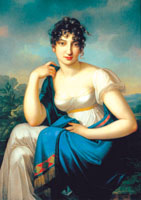The Power of Conversation: Jewish Women and Their Salons
August 22–December 4, 2005
This exhibition is presented at the McMullen Museum by the New Center for Arts and Culture, Boston and Boston College.
The Power of Conversation highlights the role played by the salons
of Jewish women in the development of art, literature, music, theater, philosophy,
and politics in Europe and America from the late eighteenth century through
the
Second
World War. An influential and radical vehicle for the “democratization
of the public sphere,” the salon provided a context
in which nobles, artists, and intellectuals exchanged ideas across barriers
of class, gender, nationality, ethnic origin, and religion. Moreover, salons
enabled
women and Jews—whose participation in official public life was
restricted—to
play a prominent role in shaping modern cultural life.
This widely-acclaimed exhibition, which opened earlier this year at the Jewish
Museum in New York, probes the role that private conversations had in fostering
the careers of celebrities like Felix Mendelssohn, Marcel Proust, Oscar Wilde,
Gustav Klimt, Pablo Picasso, Marcel Duchamp, and Greta Garbo. Amalie Beer and
Fanny Mendelssohn Hensel, who convened music salons in Berlin; Gertrude Stein,
in whose Left Bank home leading avant-gardists met in Paris; Ada Leverson,
who welcomed Oscar Wilde to her London literary gatherings; Margherita Sarfatti
in Milan and Rome and Bertha Zuckerkandl in Vienna who established modernist
art salons; ardent feminist Anna Kuliscioff, who convened a political salon
in Milan; and Florine Stettheimer and Salka Viertel who hosted their guests
in New York and Los Angeles respectively, are among the women examined.
The exhibition comprises more than 150 objects including portraits of the salonières
and their guests, manuscripts, musical scores, sculpture, paintings, drawings,
books, furniture, and films. Visitors to the exhibition may hear conversations,
memoirs, letters, and performances of the hostesses and their guests on an
audio guide. A fully illustrated catalogue with essays by various scholars,
including the two co-curators, Emily Bilski and Emily Braun, accompanies the
exhibition.
This exhibition has been organized by The Jewish Museum, New York, and was made possible in part by the Andrea & Charles Bronfman Philanthropies and the Dorot Foundation. The exhibition is presented at the McMullen Museum by the New Center for Arts and Culture, Boston with support from the Dorot Foundation and by Boston College in conjunction with the inauguration of its interdisciplinary Jewish Studies Program.
The Power of Conversation focuses on 14 of the most powerful women who hosted these salons. Included are: the first Jewish salonières, Henriette Herz and Rahel Levin Varnhagen in 1780s Berlin; Fanny von Arnstein and her sister Cäcilie von Eskeles in Vienna; the famed music salons of Amalie Beer and Fanny Mendelssohn Hensel (the sister of Felix) in Berlin; the 1890s literary salons of Ada Leverson in London and Geneviève Straus in Paris; the subversive political salon of Anna Kuliscioff in Milan; the modernist art salons of Berta Szeps Zuckerkandl in Vienna and Margherita Sarfatti in Milan; the avant-garde gatherings of Gertrude Stein in Paris and Florine Stettheimer in New York; and the salon of Salka Viertel in 1930s Los Angeles.
Some of the text on this page provided by the Jewish Museum, New York. Used with permission.


